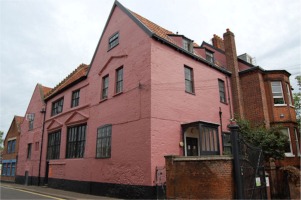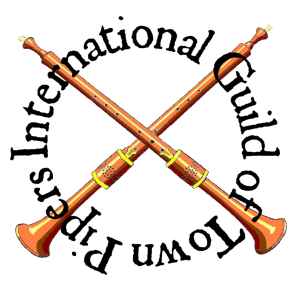Norwich Waits
Edmund Roe
On 3 February 1722 the Norwich Gazette published verses: “made by one Mr Henry Least” in praise of Edmund Roe, one of Norwich’s minstrels (or Waits) who was an excellent violinist. Theses verses were set to music by Charles Lulman:
When the ingenious Row
Directs his nimble bow,
And artful graces give the smallest string,
I think ten thousand Nymphs and Syrens sing,
To banish my fatigue of grief and cares,
With Wat’y murmurs and Aethereal Airs:
And if he does the larger touch,
The charming melody is such,
I think Apollo wakes his Sacred Lyre,
Or that I hear the bright Celestial Choir,
But when upon them all he rolls and ranges,
Runs such divisions, such delightful changes,
Such sounds salute my more than ravished ears,
As parallel the Musick of the Spheres.
Mr Least had ample opportunity to hear the “nimble bow” as in the first half of the 18th century the minstrels performed regularly at the assemblies which were held during Assize Week and Sessions Week at Chapelfield House. Organised by Abraham Catherall, they were continued by his wife after his death in 1731.
By Haydn Brown.
Source: Stephen, G.A., The Waits of the City of Norwich Through Four Centuries to 1790, Goode, 1933)
As quoted in Christopher Marsh’s book, “Music and Society in Early Modern England”
(Cambridge University Press, 2013. ISBN 1107610249, 9781107610248.)
Norwich
1536: Each wait paid £1.00 per annum
~1650: Wait Peter Sandlyn paid the corporation a nominal rent for his occupancy of one of the “Suffragans Tenements”.
1670s: The waits reported a rival band of local men who had all “left their Trades and turn’d fiddlers”. The city council ordered the men to resume their proper callings and cease their musical activities forthwith.
1553-1629: The waits performed Sunday evening concerts from the roof of the Guildhall.
1583: Each wait paid £3.00 per annnum
1584: Had a noyse of shawms, two trumpets, five sackbuts, one lysarden and four drums
1578: Visit of Elizabeth I, the waits played, among other pieces, the consort songs ‘From Slumber Soft’ and ‘What Vayleth Life’.
1599: Will Kemp praised “their excellency in wind instruments” and “their rare cunning on the Vyoll and Violin.”
1612: Thomas Quashe was admitted to the waits on condition that he came eqipped with his own “treable violin”.
1638: Thomas Quashe died, his inventory containing “two Cornets one treble viall and a flute recorder”.
1666: Each wait paid £6.00 per annum
1676: Had four sackbuts, three hautboys and three cornetts.
Norwich Waits
Music and Musicians in Renaissance Cities and Towns, Edited by Fiona Kisby – Cambridge University Press.
This extract is from the chapter by J. Saunders citing Norwich city records from late 16th and early 17th centuries (this is also cited in REED Norwich):
Eight lay clerks at Norwich cathedral (‘ffydling and pyping knaves’ in the opinion of one of their colleagues) doubled as city waits.
John Weston, John Tyler, Will. Reeve, Sam. Cooke, and Isaac Lawes, wayts.
‘The city of Norwich, chapter 37: Of the city in the time of King George II’, An Essay towards a Topographical History of the County of Norfolk: volume 3: The History of the City and County of Norwich, part I (1806), pp. 443-454.
URL: http://www.british-history.ac.uk/report.aspx?compid=78007&strquery=wayts
The Parish Clerks, and Sextons, with their banner, wayts, and minstrels, hold their gild on Thursday before Whitsunday. These twenty companies, with their several banners, on which their patron saints were painted, and each company in their livery of one suit, with the several masters (fn. 41) of the crafts going before them, with musick, &c. made fine processions on their gild-days, and at the swearing of the mayor.
‘The city of Norwich, chapter 24: Of the city in Henry VIII’s time’, An Essay towards a Topographical History of the County of Norfolk: volume 3: The History of the City and County of Norwich, part I (1806), pp. 192-220.
URL: http://www.british-history.ac.uk/report.aspx?compid=77994&strquery=wayts
The Music House, Norwich.
“This house was at one time a house of resort for those musicians that were called the City Waits. They were established in the reign of queen Elizabeth, who presented them, five in number, with their instruments, and each a house in King street, to reside in; this body became defunct in the mayorality of Mr. alderman Weston, by an order from the corporation. In October, 1804, died, aged 77, Mr. William Johnson, a noted teacher among the amateurs of vocal and instrumental music; he was, for nearly fifty years, a leather-seller, and for thirty years one of the city waits.”
“In this parish [the parish of St Etheldred] is the Music House, anciently the great messuage of Moses the Jew, a man of great wealth and ability in the time of William Rufus; it afterwards took the name of Isaac’s hall, from Isaac the grandson of Abraham.”

“Abraham’s hall, a very ancient inn, known by the sign of “Abraham offering his son Isaac,” on the south side of the Haymarket, was the site or quadrangle which is now occupied in part by the Norwich Museum, and Literary Institution. It Derieved its name from Abraham, the son of Deulecresse, the Jew, who being convicted of and burnt for blasphemy, and other crimes, forfeited his estate to the crown, which was granted, 1278, by king Edward I., with seven shops adjoining, to Vincent de Kirkeby.”
“Feb. IV. 1576. This day the hole company of the waytes of this citte, did come here into this court, and craved that they might have leve to playe comedies, and upon interludes, and sucj other playes and tragedies which shall seem to them mete; which said petition by the whole consent of this court is granted to them, so far as they do not playe in the tyme of divine service and sermons.”
“1589. xxv Jan. This daye was redd in the court, a letter sent to Mr. Mair and his bretheren, from sir Frances Drake, whereby he desyreth that the waytes of this citie may be sent to hym, to go the new intended voyage; whereunto the waytes being here called, do all assent, whereupon it is agreed that they shall have vi cloakes of stamell cloth made them redy before they go; and that a waggon shall be provided to carry them and their instruments, and that they shall have iiii lb. to buye them three new howboyes and one treble recorder, and x lb. to beare theire chargys; and that the citie shall hyre the waggon and paye for it. Also that the chamberlyn shall paye Peter Spratt xs. 3d. for a saquebut case; and the waytes to delyver to the chamberlyn before they go the citie’s cheanes.”
“On the 27th November, 1622, the city possessed the following instruments of music:- Fower sackbutts, fower howboyes and an old howboye broken, two tenor cornetts, one tenor recorder, two counter-tenor recorders, two tenor cornetts, five chaynes, and five fflagges.”
1709 “This is to give notice to all true lovers of music that have a mond to learn on the violin, haughtboy, that Thomas Lawes, junior, one of the city weights, will teach them as well and as reasonable as any man in the town. He lives at the sign of the Queen’s Head, near Hogg hill, in St. Peter’s parish.”
“The city waits, mentioned above, seem to have been the great musicians of the time.”
“For the benefit of Mr. William Reeve, the new city waite, on Thursday, April 25th, 1734, at Chapel field house, in Norwich, will be a Concert of Music. Tickets to be had at his own house, &c. at 2s. 6d., in St. Lawrence. There will be Country Dancing given gratis after the Concert, where will be the City Music to give their attendance, and all other attendance. To be at the door at 4 o’clock, and to begin at 6, by reason of Country Dancing.”
Source: A general history of the county of Norfolk, Edited by John Chambers, 1829, pp.1069,1271,1272.
Please also see: Norwich Music House
